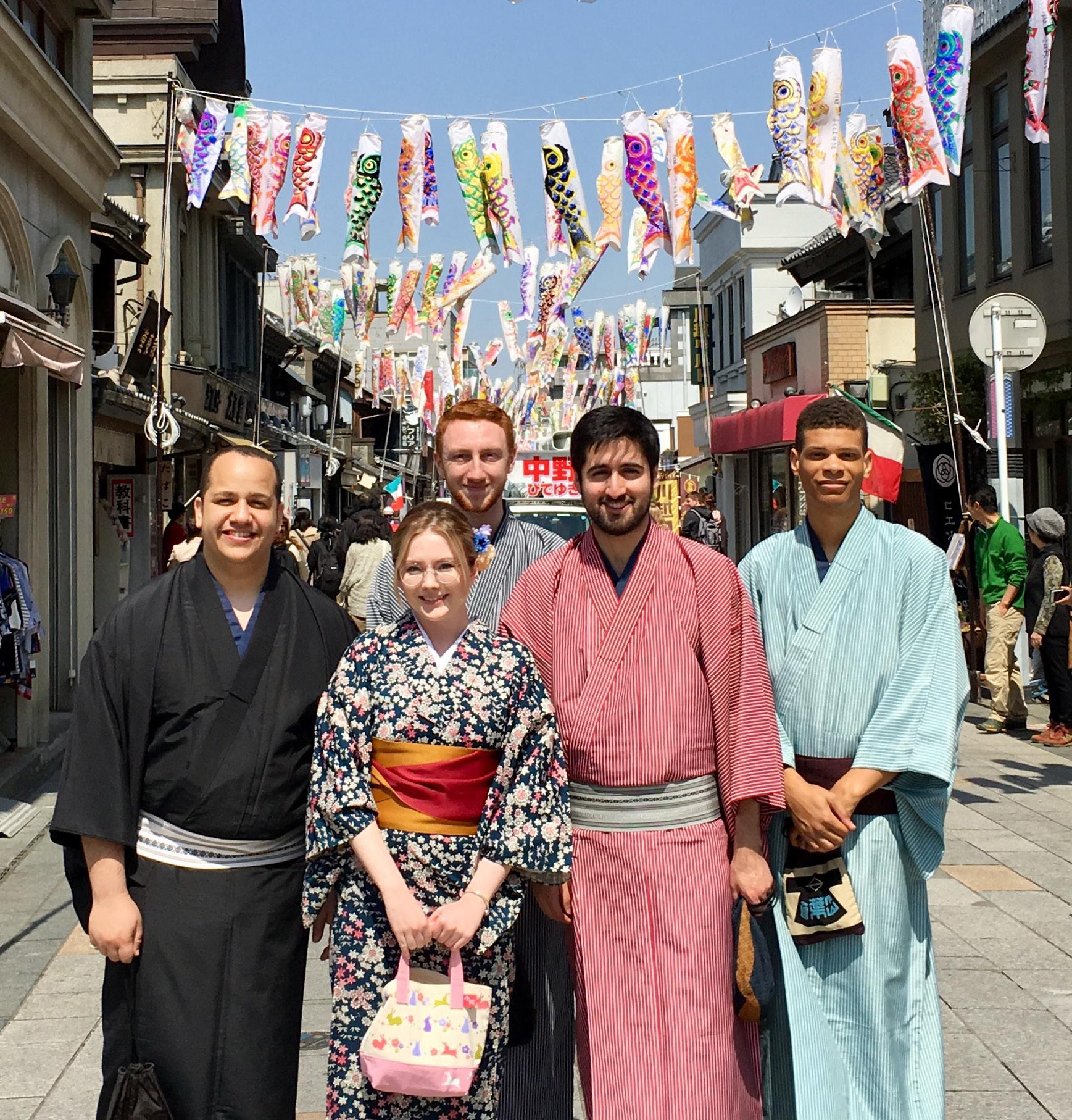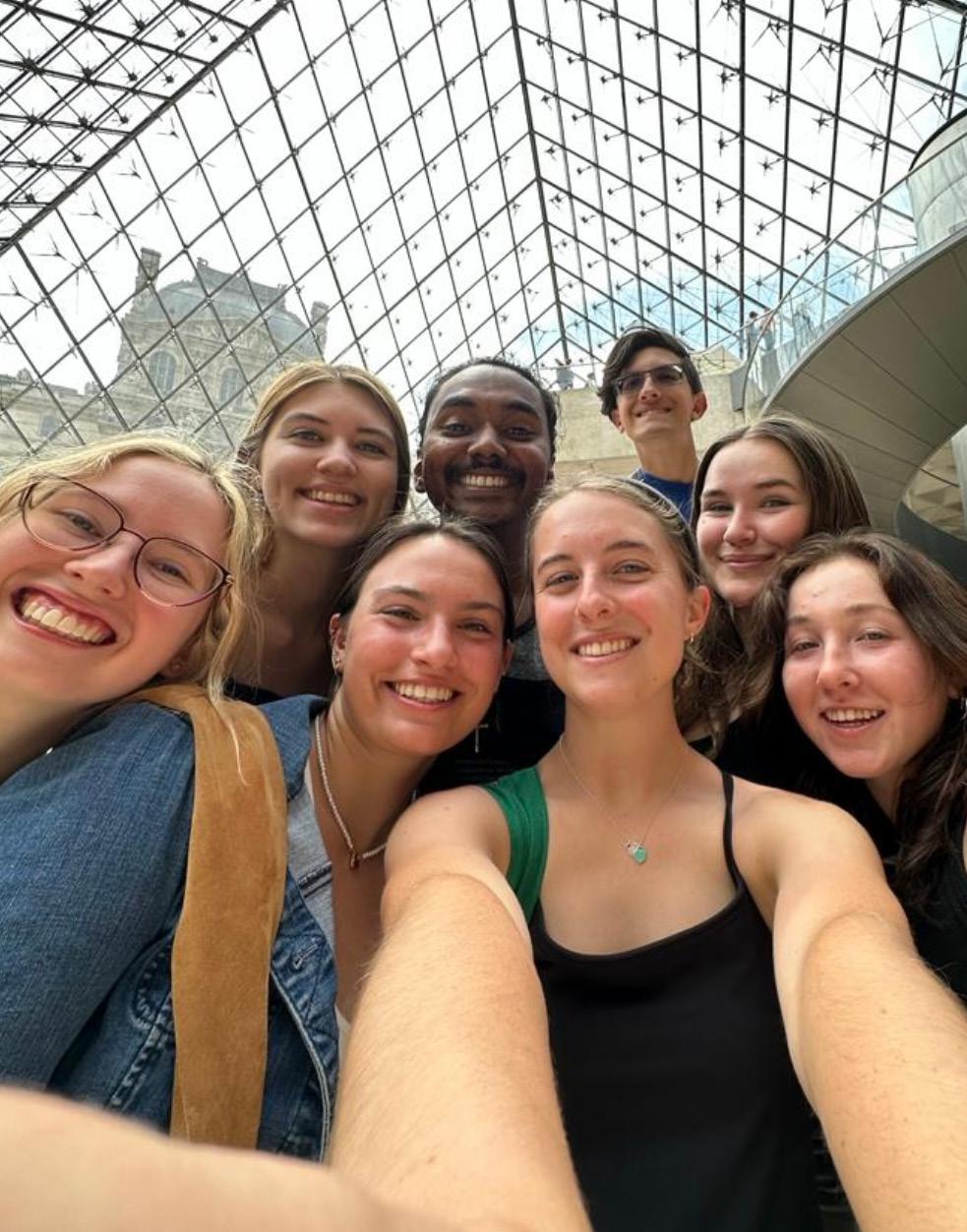Family orientation guide







We’re here to support your student through both the challenges and rewards of international travel. From pre-departure preparation to on-site assistance, our passionate team ensures they have the tools and guidance needed for a successful and enriching journey.

Main point of contact for your student before departure. With specific knowledge of the program and host city, the Program Manager oversees admissions and guides students through academics, housing, visas, local culture, transportation, and safety.
Manages payments, sets up payment plans upon request, and advises on the use of financial aid if applicable.
There to support your student, coordinating housing, cultural activities, and excursions. Upon arrival, they provide a Bridging Cultures Orientation (BCO), offering guidance on goal setting, intercultural awareness, and professional development. This helps students adjust to their new environment and sets the stage for a rewarding, transformative experience.
Refer to the ISA or TEAN website to find other helpful resources and information as you read this guide.
“We were really impressed by your program and would highly recommend it to any student thinking about studying abroad!”
Linda C. Parent of UCLA Student
This timeline summarizes the key steps to guide your student through the preparation process before their program. Use as a checklist and reference the respective sections of this guide for additional support at each stage.
• Contact Home Institution: Ensure your student understands understands the process and credit transfer requirements.
• Financial Aid/Scholarship Process: Begin applications early if applicable.
• Apply for/Renew Passport: Passport should be valid for at least 6 months after the scheduled return date. (Note: Parents/guardians are also encouraged have passports in case of emergencies).
• Familiarize with Visa Requirements: Ensure all entry requirements for the host country are understood (if applicable).


After submitting their application, students will receive an email from ISA or TEAN within 2-3 business days with login details for their Student Portal. They must log in within 5 days to access:
• Application materials (e.g., scholarship opportunities, official transcript, passport info, course selections)
• Submission instructions and status updates
• Contact information for their team
The Student Portal is your student’s central hub for managing all aspects of their program preparation. They can access a list of required application materials, submit important documents such as their passport, references, and course selections, and explore available scholarship opportunities. It also houses essential forms, including urgent notes, their student record, and personal details like their passport information, host and home institution details, and contact information.
Rest reassured knowing that students can review program dates, account status, payment deadlines, and flight instructions in one place. The Student Portal also provides access to invoices, payment history, financial aid information, and the Financial Aid Verification of Award (VOA). Two to four weeks before departure, students will be able to access the Arrival Guide, which includes housing details and final arrival information.
Includes housing details, arrival information, and participant list. Students should print and carry these documents during travel.
Students will receive their acceptance email with instructions to:
• Complete final forms and program payments (ACH is now available)
• Submit the Financial Aid Verification of Award (VOA) for financial aid (if applicable)
Students should check the Student Portal for due dates. Some forms may be required earlier.
• For students at direct bill institutions, (noted in their Student Portal), payments are handled directly by the home institution.
Attend pre-departure orientation Students join a virtual meet and greet along with other travelers to get their final details and ask any outstanding questions.
Students can access packing guidelines and a checklist within the Student Portal.
Submit travel forms
Students must submit their flight forms and travel itinerary 4 weeks before the program start date.
Final steps before the journey begins!

Supporting your student while encouraging independence is key to their success abroad. Keep the following in mind as you prepare them for travel.
Your student must submit the Medical Self-Disclosure and Specialist Clearance forms, which help on-site staff manage medical and housing needs. Health, safety, and cultural norms will also be covered during orientation.
In emergencies, students should contact resident on-site staff immediately for medical or safety concerns. A U.S.-based on-call staff member is also available. Students should have a credit card or $500 in emergency funds and know how to contact local emergency services.
We monitor all program locations for political or natural disasters. If an event affects the program, students will receive instructions, and updates will be posted on the Worldwide Alerts page of our website. For a full list of travel advisories, visit the U.S. Department of State’s website.
Contact our U.S. office. For after-hours emergencies, a representative is available 24/7 via our emergency phone line.
Our programs include a Blanket Accident & Sickness Policy for the official program period. For coverage outside this period, students can arrange extra insurance. Our medical insurance policy is provided to students in their Student Portal.
Ensure your student receives any required vaccinations for their host country. It’s also a good idea for families to update their vaccines in the event of visiting students or emergency travel.
Ensure your student enrolls in the Smart Traveler Enrollment Program (STEP), a free service that allows the Department of State to contact them in case of emergency.
TIP: Ensure students register with the U.S. Embassy in their host country.
If aid is delayed, students should contact their home institution’s financial aid office and inform their Region & Account Manager. Any adjustments to the aid amount must be reported, and any shortfall paid immediately.
Students will finalize their academic schedule during the first week abroad. If concerns arise, they should contact their resident on-site staff. Pre-approval of courses from their home institution is important to ensure smooth credit transfers.
Host universities may take 3-4 months to issue official transcripts after program completion. Students should save all syllabi and assignments, as these may assist with credit transfer before the official transcript is available.
We review housing evaluations to ensure accommodations meet student needs. Housing is assigned based on responses to the Housing Questionnaire, so detailed information is crucial.
Encourage your student to address any conflicts directly with their host family, as many issues stem from cultural misunderstandings. If problems persist, resident on-site staff can assist.
Students should handle roommate conflicts respectfully, understanding that everyone is adjusting to new cultures. Resident on-site staff can mediate unresolved issues.
Students with dietary needs should note them in the Housing Questionnaire and discuss them with their host family. If issues continue, resident on-site staff can help. Keep in mind that food accommodations vary by location.
“I can hardly find the words to say what it meant to feel assured that there was someone along the way who would be looking out for my daughter. One of the reasons she chose ISA for her study abroad program was she felt that your organization would provide good on-site support. She certainly chose wisely.”
Eileen W. Parent of Carnegie Mellon University Student
Adjusting to a new culture is a key part of traveling abroad and can result in a range of emotions. Help them ease the transition and feel more comfortable abroad by exploring their host culture before departure.
Encourage your student to connect with our alumni network of Global Ambassadors and get a first-hand perspective on what it’s like to travel with us.
Ensure your student understands local laws, medication restrictions, and ways to avoid unwanted attention.
Talk about budgeting, credit card use and notifying their bank of travel plans.
Clarify how their credits will transfer back to their home institution.
Encourage them to use resources like Google Maps, the Site-Specific Online Orientation, and social media to get familiar with their new environment.


Once your student is abroad, your continued encouragement will boost their confidence as they adjust. Remind them to immerse themselves in exploring their host city and embracing new experiences, and to reach out to resident on-site staff if they need support.
As your student begins their program, you may notice the frequency of their communication slow down. This is a good thing! They’re becoming immersed in the culture and their environment, and learning more about themselves and the world every day.
It’s important to allow them to remain present in their experience and allow them to take the lead in establishing a communication cadence. Likely, a few check-ins per week through text or video calls will keep you connected without overwhelming them, and you can always use email for longer updates on their travels. By letting your student take the lead on staying in touch, you’ll allow them the freedom to fully engage with their new environment.

“When a child travels abroad alone without knowing anyone, it can be a little scary. Staying five weeks away makes it only more nerve racking. When a child does this with ISA it should give parents a sense of peace. The student will be not just O.K., but great! There are not enough words to express how pleased and impressed I am with your organization. My daughter graded her experience A+! I think that says it all.”
Ana V. Parent of Loyola University Student



Challenges are a natural part of any international experience. While it’s important to offer support, encouraging your student to solve problems independently can provide invaluable life lessons. Below are some FAQ’s to help you guide them through common issues they may encounter.
HOW SHOULD MY STUDENT PROTECT THEIR FINANCIAL AND PERSONAL INFORMATION?
Students should make copies of all important cards and IDs and store them securely. One set of copies can be left with a trusted friend or family member. It’s also important for students to notify their bank and credit card companies of their travel plans to avoid any issues abroad.
WHAT IF THEIR WALLET IS LOST OR STOLEN?
If this happens, students should immediately contact their bank and credit card companies using the copies they made, then notify resident on-site staff for assistance. Staff can help file a police report and explore options for emergency funds if needed.
HOW SHOULD MY STUDENT PROTECT PERSONAL BELONGINGS?
We recommend students avoid bringing expensive or irreplaceable items and consider securing insurance for personal belongings. This can be done through independent travel insurance or homeowners/renter’s policies. ISA and TEAN are not responsible for lost or damaged property.
WHAT IF MY STUDENT LOSES THEIR PASSPORT?
Students must report a lost passport to local authorities immediately. Resident on-site staff can provide guidance on contacting the consulate or embassy and help with the application for a replacement. A valid passport is required for international travel, so students should keep copies of their passport and visa, sharing them with a trusted contact for emergencies.
WHAT IF MY STUDENT FEELS HOMESICK?
Homesickness is a normal part of the adjustment process. Encourage your student to seek support from peers and resident on-site staff. Refer to the “Navigating new cultures” section of this guide for more insights on how to handle homesickness.
WHAT SHOULD MY STUDENT PACK FOR THEIR JOURNEY?
For a full packing list and other considerations when preparing for their trip, students can refer to their Student Portal. Encourage your student to travel light, adapt to local culture, and keep essential documents secure.
HOW CAN I HELP MANAGE MY STUDENT’S EXPECTATIONS?
Remind your student that not all expectations will be met, and that’s okay. Adjusting to new environments fosters growth and independence. Encourage them to embrace new experiences and understand that different doesn’t mean worse—it’s part of the learning and travel experience.
DOES ISA OR TEAN ARRANGE TRAVEL FOR VISITING FAMILIES?
No, families are responsible for their own travel and accommodations if they choose to visit their students while abroad. Your student or resident on-site staff can recommend nearby hotels, or you can explore options online.
WHEN IS THE BEST TIME TO VISIT MY STUDENT?
The best time to visit is during a long break or at the end of your student’s program. We recommend avoiding visits at the start, as this period is key for their adjustment and participation in activities and orientation.
CAN I STAY IN MY STUDENT’S HOUSING?
No, ISA and TEAN housing is reserved for students only. Your student can assist in finding nearby accommodations that suit your needs.
Public transportation is typically the most efficient way to travel in most cities. Rental cars are available but may not be necessary depending on your destination.
DO I NEED TO PREPARE FOR HEALTH AND SAFETY?
Make sure to check for any required vaccinations and register with the U.S. Embassy in the country you’re visiting. Stay informed about local health and safety updates during your trip.
Still have questions? Contact us at isa@studiesabroad.com or info@teanabroad.org
Adjusting to life back home after traveling abroad can sometimes be challenging. Your student may have feelings of restlessness or difficulty connecting with those who haven’t shared the same experiences.
To help ease the transition, and to support their momentum in moving forward, a number of resources are available in their Student Portal under “Alumni Resources.” These include tips for life after their program and how to articulate their experience when applying for jobs or graduate schools.
Encourage your student to explore new academic paths inspired by their time abroad, such as adding a minor or sharing their experiences with campus groups.
Help your student stay connected by subscribing to international publications, practicing language skills or keeping in touch with friends and host families.
Encourage your student to update their resume and LinkedIn with their international experience. They can also get involved by joining our paid Global Ambassador program or volunteering with their Study Abroad Office.
Reminder: Help your student stay connected to their international journey and turn it into future growth. Encourage your student to use campus resources like the study abroad office, career center, and academic advisors to fully integrate their international experience into their future plans.
We hope this guide has empowered you with the resources to confidently support your student on their international adventure. Your guidance combined with our step-by-step assistance is key to a smooth journey. With these helpful tools, you can rest assured that you’ve set them up for success.
Remember—learning doesn’t stop when their program ends! Encourage your student to carry their international experience forward as they explore new opportunities abroad and beyond.
Submit a Testimonial Web: studiesabroad.com | teanabroad.org Phone: 512-480-8522
If you’re a family member of a current or past ISA/TEAN student and would like to share your experience, please email alumnirelations@worldstrides.com. By submitting, you grant us permission to use your comments in publications.
